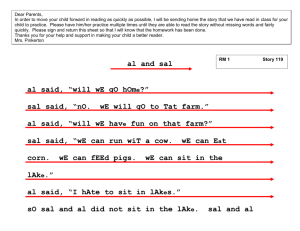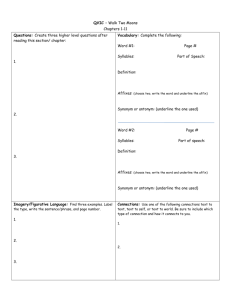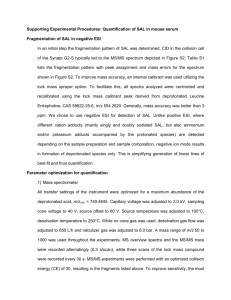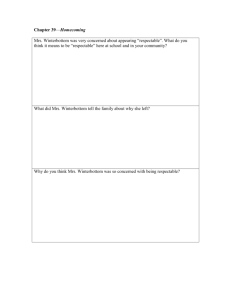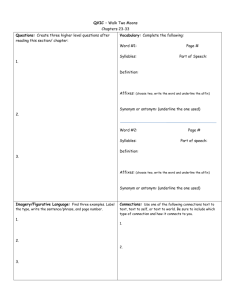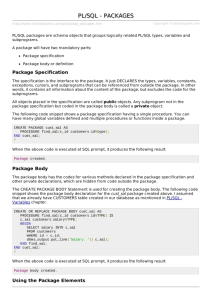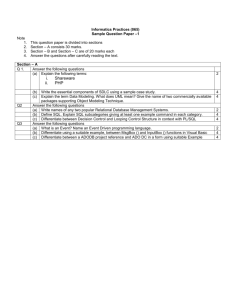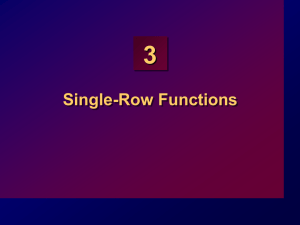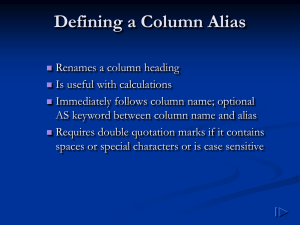Review Assessment: PL/SQL MIDTERM
advertisement
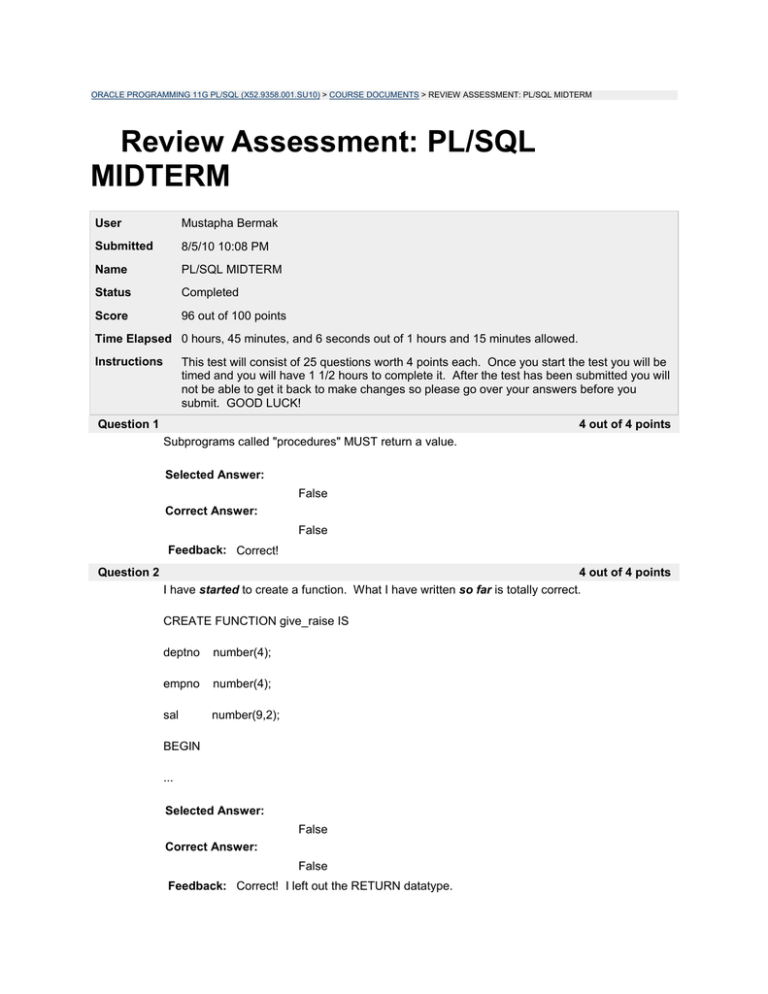
ORACLE PROGRAMMING 11G PL/SQL (X52.9358.001.SU10) > COURSE DOCUMENTS > REVIEW ASSESSMENT: PL/SQL MIDTERM
Review Assessment: PL/SQL
MIDTERM
User
Mustapha Bermak
Submitted
8/5/10 10:08 PM
Name
PL/SQL MIDTERM
Status
Completed
Score
96 out of 100 points
Time Elapsed 0 hours, 45 minutes, and 6 seconds out of 1 hours and 15 minutes allowed.
Instructions
This test will consist of 25 questions worth 4 points each. Once you start the test you will be
timed and you will have 1 1/2 hours to complete it. After the test has been submitted you will
not be able to get it back to make changes so please go over your answers before you
submit. GOOD LUCK!
Question 1
4 out of 4 points
Subprograms called "procedures" MUST return a value.
Selected Answer:
False
Correct Answer:
False
Feedback: Correct!
Question 2
4 out of 4 points
I have started to create a function. What I have written so far is totally correct.
CREATE FUNCTION give_raise IS
deptno
number(4);
empno
number(4);
sal
number(9,2);
BEGIN
...
Selected Answer:
False
Correct Answer:
False
Feedback: Correct! I left out the RETURN datatype.
Question 3
4 out of 4 points
The check_sal function is invoked correctly below:
IF check_sal(v_avgsal) IS NULL THEN
DBMS_OUTPUT.PUT_LINE('The function returned NULL due to exception');
ELSIF check_sal(v_avgsal) THEN
...
END IF;
Selected Answer:
True
Correct Answer:
True
Feedback: Correct!
Question 4
0 out of 4 points
Which of the following is not true of a host variable:
Selected Answer:
It is declared and exists externally to the PL/SQL subprogram.
Correct Answer:
Can be referenced in a stored subprogram.
Feedback: Incorrect. You cannot reference a host variable from a stored procedure
because you don't know which environment will call this procedure.
Question 5
4 out of 4 points
You are creating a procedure that will be getting data from the EMPLOYEES table (with
columns called last_name and salary) and bringing it into variables in your procedure to
examine. You want your variables to look like the columns in the EMPLOYEES table.
The declaration section of this procedure is written correctly.
CREATE OR REPLACE PROCEDURE examine_emps (empno IN NUMBER) IS
v_last_name
employees%TYPE;
v_salary
employees%TYPE;
BEGIN
...
END examine_emps;
Selected Answer:
False
Correct Answer:
False
Feedback: Correct. When using %TYPE here you need to list table.column%TYPE;
v_last_name
employees.last_name%TYPE;
v_salary
employees.salary%TYPE;
Question 6
4 out of 4 points
You can give a default value for a parameter as in the example below:
CREATE OR REPLACE PROCEDURE check_order
(order_clerk
NUMBER DEFAULT 7789) IS
...
END check_order;
Selected Answer:
True
Correct Answer:
True
Feedback: Yes, you can give a default value to a parameter.
Question 7
4 out of 4 points
Below there are two procedures, add_regions(which inserts new regions into the regions
table) and create_regions (which calls the add_regions procedure).
The Northeast region with a manager_id of 7899 is not inserted because of an integrity
constraint violation on the manager_id. When the procedure create_regions is finished
executing you can query the regions table and see that the Northeast region was not inserted,
however the Southeast and Northwest regions were inserted into the regions table.
____________________________________________________________
CREATE PROCEDURE add_regions(
name VARCHAR2, mgr NUMBER, loc NUMBER) IS
BEGIN
INSERT INTO REGIONS (region_id,
region_name, manager_id, location_id)
VALUES (REGIONS_SEQ.NEXTVAL, name, mgr, loc);
DBMS_OUTPUT.PUT_LINE('Added Region: '||name);
EXCEPTION
WHEN OTHERS THEN
DBMS_OUTPUT.PUT_LINE('Err: adding region: '||name);
END;
____________________________________________________________
CREATE PROCEDURE create_regions IS
BEGIN
add_regions('Southeast', 7782, 1800);
add_regions('Northeast', 7899, 1900);
add_regions('Northwest', 7767, 1700);
END;
____________________________________________________________
Selected Answer:
True
Correct Answer:
True
Feedback: Correct. The create_regions procedure calls the add_regions procedure.
When the row for the Northeast region fails, the add_regions procedure's
EXCEPTION section handles it using the WHEN OTHERS exception handler,
and then returns to the caller, which is create_regions. The create_regions
procedure then continues processing. It's next step is to call the add_regions
procedure again passing it the information for the Northwest region.
Question 8
4 out of 4 points
A developer can see the source code for PL/SQL subprograms he/she has created by querying
the data dictionary view USER_OBJECTS.
Selected Answer:
False
Correct Answer:
False
Feedback: Correct! The source code is not in USER_OBJECTS, it is in USER_SOURCE.
Question 9
4 out of 4 points
Which of the methods below is not a method for passing parameters to a
procedure.
Selected Answer:
Directional
Correct Answer:
Directional
Feedback:
Question 10
Correct! Directional is not one of the methods for passing
parameters.
4 out of 4 points
A stored function called from a SELECT statement cannot contain DML statements.
Selected Answer:
True
Correct Answer:
True
Feedback: Correct!
Question 11
4 out of 4 points
Which parameter mode(s) below would you not use in an Oracle stored function?
Selected Answers:
IN OUT
OUT
Correct Answers:
IN OUT
OUT
Feedback: Correct. You would only use IN for an Oracle stored function.
Question 12
4 out of 4 points
You have a stored function called tax. You want to call this function from within
your tax_employee procedure. You create the code for the procedure and
function as listed below and it will run successfully.
CREATE OR REPLACE PROCEDURE tax_employee
(v_empno IN NUMBER) IS
v_taxed_sal emp.sal%TYPE;
v_old_sal
emp.sal%TYPE;
BEGIN
SELECT sal
INTO v_old_sal
FROM emp
WHERE empno = v_empno;
Tax(v_old_sal);
v_taxed_sal := v_old_sal;
UPDATE emp
SET sal = v_taxed_sal
WHERE empno = v_empno;
END tax_employee;
/
Selected Answer:
False
Correct Answer:
False
Feedback: Correct! You must call a stored function from an expression. You cannot
just call it as you would a procedure.
Question 13
4 out of 4 points
A package body can exist without a package specification.
Selected Answer:
False
Correct Answer:
False
Feedback: Correct! A package body must have a package specification.
Question 14
4 out of 4 points
In the following code, g_comm is a private variable:
CREATE OR REPLACE PACKAGE comm_package IS
g_comm NUMBER := 10;
Selected Answer:
False
Correct Answer:
False
Feedback: Correct! Here it is written in the package specification therefore it is a public
variable.
Question 15
4 out of 4 points
You have a package named global_vars which contains a procedure named meter_2_yard.
You want to call this procedure from within the following stand-alone procedure. This will run
successfully as written.
CREATE PROCEDURE meter_to_yard
(v_meter IN NUMBER,
v_yard OUT NUMBER) IS
BEGIN
v_yard := v_meter * meter_2_yard;
END;
/
Selected Answer:
False
Correct Answer:
False
Feedback: Correct! You must call the procedure using the package name, i.e.,
global_vars.meter-2_yard.
Question 16
4 out of 4 points
A user logs in, uses a public (global) variable (puts a value in it) in a package, logs off but
logs back in right away. The value that user put in that global variable still available the
second time the user logs in.
Selected Answer:
False
Correct Answer:
False
Feedback: Correct! Once the use logs out all of his global variables are gone!
Question 17
4 out of 4 points
Which of the following statements is not true of overloading:
1. Allows you to use the same name for different subprograms inside a package.
2. Requires the formal parameters of the subprograms to differ in number, order,
or datatype family.
3. Requires the formal parameters of the subprograms to differ in name.
Selected Answer:
Requires the formal parameters of the subprograms to differ in
name.
Correct Answer:
Requires the formal parameters of the subprograms to differ in
name.
Answer
Feedback:
Correct!
Feedback: Correct! Overloading requires the formal parameters of the subprograms to
differ in name.
Question 18
4 out of 4 points
The following package contains an overloaded procedure named add_dept.
CREATE OR REPLACE PACKAGE over_pack IS
PROCEDURE add_dept
(v_deptno
IN
v_name
IN
v_loc
IN
END over_pack;
/
dept.deptno%TYPE,
dept.dname%TYPE,
dept.loc%TYPE);
Selected Answer:
False
Correct Answer:
False
Feedback: Correct! There is only one procedure here so it is not written as overloaded.
Question 19
4 out of 4 points
In the package below, the value in rate_value will be placed into the tax
vairable:
CREATE OR REPLACE PACKAGE BODY taxes IS
-- declare all variables and procedures/functions
-- define all procedures and functions
BEGIN
SELECT
rate_value
INTO
tax
FROM
tax_rates
WHERE
rate_name = TAX ;
END taxes;
/
Selected
Answer:
The first time anything is called that is inside the taxes package.
Correct
Answer:
The first time anything is called that is inside the taxes package.
Answer
Feedback:
Correct! The first time anything is called that is inside the taxes package,
this one-time-only block of code at the end of the package body will be
executed.
Feedback: Correct! The first time anything is called that is inside the taxes package, this
one-time-only block of code at the end of the package body will be executed.
Question 20
4 out of 4 points
All of the following statements have been added or extended in PL/SQL to support Native
Dynamic SQL except:
Selected Answer:
WRITE
Correct Answer:
WRITE
Feedback: Correct!
Question 21
4 out of 4 points
The Oracle supplied package you would use to generate a simple web page is:
Selected Answer:
HTP
Correct Answer:
HTP
Feedback: Correct. You would use the HTP package.
Question 22
4 out of 4 points
All SQL statements go through some or all of the following stages except:
Selected Answer:
Set
Correct Answer:
Set
Feedback: Correct!
Question 23
4 out of 4 points
The Oracle supplied packaged procedure that allows you to put text to the output line of the
buffer is:
Selected Answer:
DBMS_OUTPUT.PUT_LINE
Correct Answer:
DBMS_OUTPUT.PUT_LINE
Feedback: Correct! I knew you would get this one!!!
Question 24
4 out of 4 points
CREATE PROCEDURE create_table(
table_name VARCHAR2, col_specs VARCHAR2) IS
BEGIN
/* WHICH EXECUTE COMMAND WOULD YOU PUT HERE??? */
END;
/
Selected
Answer:
EXECUTE IMMEDIATE 'CREATE TABLE
'||table_name|| ' (' || col_specs || ')';
Correct
Answer:
EXECUTE IMMEDIATE 'CREATE TABLE
'||table_name|| ' (' || col_specs || ')';
Feedback:
EXECUTE IMMEDIATE 'CREATE TABLE '||table_name||
' (' || col_specs || ')'; is correct!
Question 25
4 out of 4 points
CREATE OR REPLACE PACKAGE BODY taxes_pak IS
v_tax NUMBER := .08;
BEGIN
INSERT INTO emp
VALUES (...
-- your executable statements here
BEGIN
SELECT rate_value
INTO v_tax
FROM tax_rates
WHERE rate_name = 'TAX';
-- rate_value in the tax_rate table for TAX is .10
END taxes_pak;
/
Given the above, the value in v_tax, when anything in this block is called (which will bring this
block into memory), will be:
Selected Answer:
.10
Correct Answer:
.10
Feedback: Correct!
